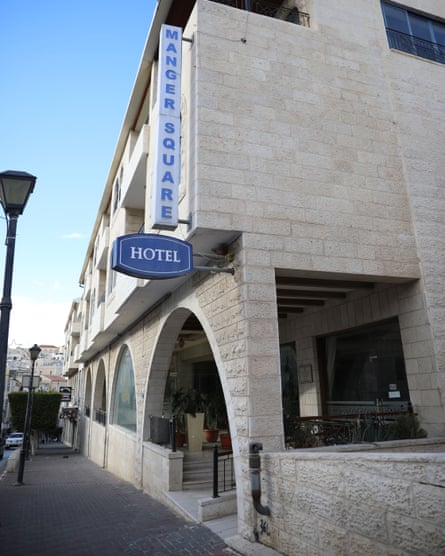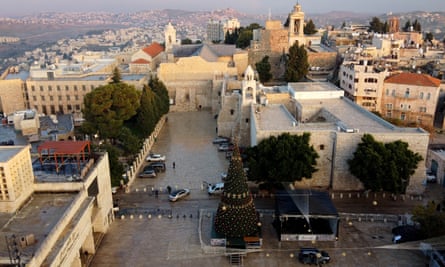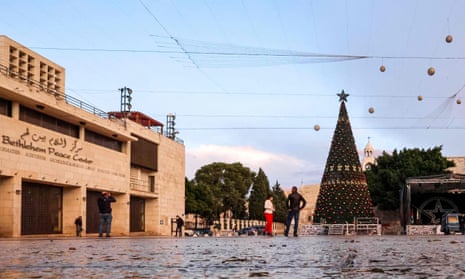Without its suited staff and jet-lagged guests, the true vastness of the 240-room hotel lobby is clear. Dozens of sofas have been stored away, and the carpets are covered in plastic sheeting to protect them from dust. Chandeliers hang lonely and lustreless in the dim light. Timezone clocks tick behind an empty reception desk.
“We can’t go on like this,” says the duty manager, Khader Hihi, who walks along the shiny tiled floors. “The whole of Bethlehem depends on tourism.”
Since March, the Manger Square Hotel, which provides four-star accommodation popular with Christian pilgrims, has been shuttered due to the coronavirus pandemic. Most other large hotels nearby are empty.

Like several governments, Israel, which controls international entries to the occupied Palestinian territories, blocked entry to non-residents, meaning the tourist industry has frozen.
With Christmas approaching, normally Bethlehem’s busiest time of year, the city is anticipating a sober affair, its first significantly empty holiday period since intense violence two decades ago. Even during the second intifada, some tourists came.
“We used to have 80 staff, which goes up to 110 at Christmas,” said Hihi, moving to a ninth-floor room, its mattresses bare, its pillows and television wrapped in plastic.
Now, only four staff come daily to make sure the building’s essential systems are running.
A hotel costs money, even when closed, Hihi says. He has to turn on the air conditioning to prevent it from clogging up. The fire system, too, has to be kept on. Add permanent staff wages and maintenance, and the monthly cost of the hotel is about $30,000, he estimates.
“Normally, we make around $25,000 a day,” he said, adding that 450 to 500 guests visit during the festive period.
There is a wider impact on the community, as well. “We usually buy 800 eggs a day from farms, plus vegetables and bread from bakeries.” Some smaller hotels, relying on local visitors, have stayed open, but are not making much money.
“Everyone is upset. Nobody knows what will happen,” said Hihi.
Next to the hotel, the King Solomon Bazaar souvenir shop is open, but not for tourists. “I come to air the shop and clean it,” said the owner of 25 years, Adnan al-Qurna.
Christmas in the city responsible for its existence it is by no means cancelled. However, it will be significantly scaled-down and will not include thousands of people as it normally does.

The Palestinian health ministry has recommended strict limits on celebrations, including the traditional tree-lighting ceremony in Manger Square, which was limited to 50 people. Restaurants are ordered to close at 9pm throughout the Christmas season.
Other events, such as the newly created Bethlehem Cultural Festival, were held digitally, with recorded performances, short films and streamed live discussions.
The occupied West Bank is suffering from a record surge in coronavirus cases, with daily infections rising above 1,000 in the territory of around 2.7 million Palestinians and about 400,000 Israeli settlers.
A Christian aid charity, Friends of the Holy Land, described the situation as a disaster for the city, estimating that around 80% of its residents were dependent on tourism.
“Nobody could have predicted the 2020 pandemic, or that this total collapse of tourism would last so long,” said the charity’s CEO, Brendan Metcalfe.

The charity launched a Christmas appeal to send money for schools and medical expenses.
“We have never had to support so many people through unemployment before. Bethlehem churches who have also helped so far, are now running out of funds, and there is nothing forthcoming from the Palestinian Authority,” he said. “There is no furlough scheme or other form of safety net, so people really need the aid we can give.”
Inside the Church of the Nativity, one of the most revered Christian sites in the world, the hordes of tourists are gone. Usually, lines of people, their smartphones flashing, descend steep stairs that lead to the grotto that traditionally marks Jesus’s birthplace. Now, the staircase, along with the rest of the church, is almost empty.
“Normally 1,100 people will come to Christmas services,” said Father Emad Kamil. “This year, we have not decided a figure yet.”
The pandemic had been a lesson in arrogance, he said. “No matter what we might think, we are weak and fragile.”
